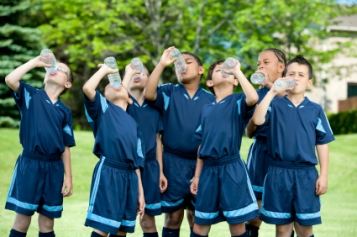Contrary to conventional wisdom, a young athlete's need to stay hydrated is a constant regardless of the sports season, Kids can become dehydrated whatever and whenever they play sports, regardless of the temperature or relative humidity.
Though the calendar may say it's spring or autumn, it may be hot in many parts of the country, and with continued heat and humidity comes the ever present risk of dehydration. Even as the sports season moves towards Halloween and Thanksgiving and the weather turns colder, dehydration remains a constant threat. Indeed, a recent study showed that cold weather actually alters the thirst sensation. When athletes don't feel as thirsty, they don't drink as much fluids, and this can cause dehydration.

Dehydration facts
With these points in mind, here are some things parents should know about dehydration in sports:
- Little weight loss required. Dehydration can begin when an athlete loses as little as 1 percent of body weight.
- In a 70-pound child, that is less than 1 pound of weight lost through sweat.
- As little as a 2% decrease in body weight from fluid loss (e.g. 1.2 lb for a 60-lb athlete) can lead to a significant decrease in muscular strength and stamina.
- It is not uncommon for some athletes to lose as much as 5 to 8 pounds through sweat during a game or practice.
- dehydration effects cognition: a 3% decrease in body water can adversely affect cognitive function. In the sports context, this may affect a child's ability to pay attention to the coach or remember a play. A body water deficit of 2% to 3% can compromise sports performance, heat dissipation, and cardiovascular function.1
- most kids are dehydrated playing sports: two oft-cited 2007 studies of kids at summer sports camps showed that a majority were dehydrated, with 25 to 30 percent showed signs of serious dehydration putting them at increased risk of heat-related illnesses. Kids were dehydrated despite the availability of water and sports drinks, frequent breaks and coaches' encouragement to stay hydrated. The studies also showed that, once children become dehydrated, it is nearly impossible for them to catch up. The majority of children are dehydrated even before they start playing sports: the same studies at summer sports camps found that almost two-thirds of children were dehydrated prior to practice. This puts the child at a disadvantage in the sport and increases their risk of heat illness.
Signs of dehydration
How to know if your child is dehydrated? Here are the signs to look for:
- Tired or feeling week. If your child tires easily and repeatedly in practice, or appears irritable, apathetic, or lacks energy, or if you see his performance suddenly decline, dehydration, and/or inadequate calorie intake may be the cause.
- Thirst (but remember, an athlete who is thirsty is already dehydrated; and thirst is not a reliable indicator of hydration status)
- Headache
- Dizziness
- Urine is bright yellow in color *urine should be almost clear)
- Trouble concentrating
- Nausea
The following are signs that your child is severely dehydrated:
- Dry lips and tongue
- Sunken eyes
- Bright colored or dark urine, or urine with a strong odor
- Infrequent urination
- Small volume of urine
The progressive effects of dehydration are serious. As a child becomes dehydrated, heart rate increases, blood flow to the skin decreases, and a body temperature can rise steadily to dangerous levels. To avoid a potentially life-threatening medical emergency, parents and coaches need to be familiar with the symptoms of and treatment for heat-related illnesses.
Maintain hydration
To keep from becoming dehydrated, parents need to make sure young athletes drink fluids before, during and after exercise, preferably on a schedule. To promote fluid intake in kids, fluids containing sodium (i.e. sports drinks) have been shown to increase voluntary drinking by 90% and prevent dehydration better than drinking plain water.
Brooke de Lench is Founding Executive Director of MomsTEAM Institute, Inc., Director of Smart Teams Play Safe, Publisher of MomsTEAM.com, author of Home Team Advantage: The Critical Role of Mothers in Youth Sports (HarperCollins), and Producer/Director/Creator of the PBS documentary, "The Smartest Team: Making High School Football Safer." Brooke is also a founding member of the UN International Safeguards of Children in Sports coalition.
She can be reached by email delench@MomsTeam.com, and you can follow her on Twitter @brookedelench.
1. Maughan RJ. Impact of mild dehydration on wellness and on exercise performance. Eur J Clin Nutr. 2003:57(supp. 2): S19-S-23.








